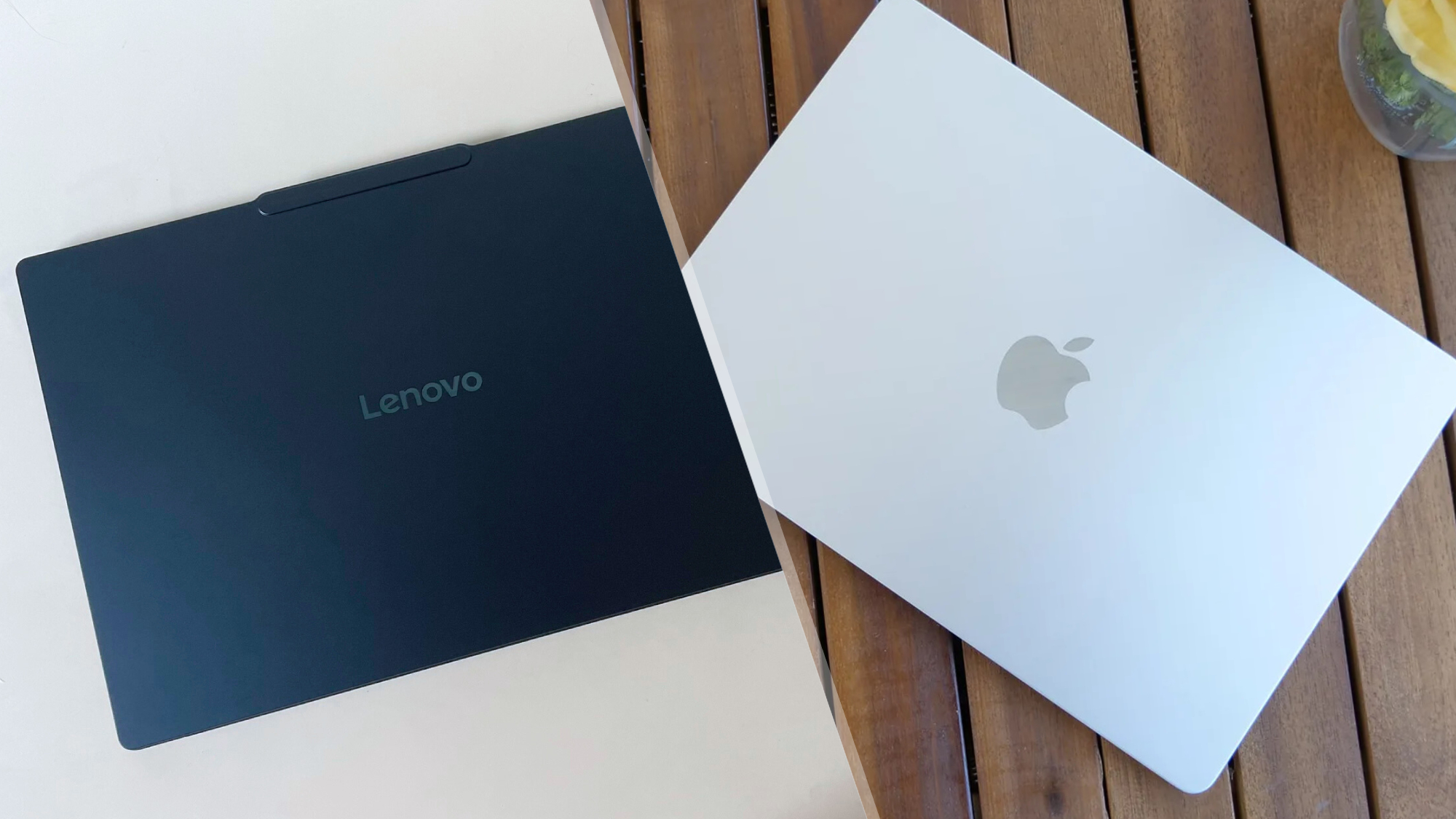
One look at the Lenovo Yoga Slim 7x is enough to tell you what laptop it’s designed to compete with: Apple’s MacBook Air M3. The question is, does Lenovo’s debut Copilot+ PC fall short of the MacBook Air or overshadow it?
The Lenovo Yoga Slim 7x is one of the first in a new series of Copilot+ PCs, which are Windows laptops powered by Qualcomm’s Snapdragon X Elite/Plus chipsets. They’re all designed to run a suite of AI features locally using Microsoft’s Copilot AI platform. Apple may not be marketing the MacBook Air M3 as an “AI PC,” but it did announce a new AI platform coming to its devices later this year called Apple Intelligence, which will run on M-series Macs.
If you’re looking for a sleek, lightweight laptop for productivity and casual tasks, both laptops are likely at the top of your list.
The Lenovo Yoga Slim 7x features a thin, polished aluminum chassis with the Lenovo logo positioned in the center of the lid, reminiscent of the classic MacBook aesthetic. It’s also in the mid-range price bracket alongside the MacBook Air. If you’re looking for a sleek, lightweight laptop for productivity and casual tasks, both laptops are likely at the top of your list.
Here at Laptop Mag, we want to ensure you have all the information you need to pick the best laptop for you, so we ran a plethora of thorough benchmark tests on these two laptops to see precisely how they measure up. Here’s a detailed look at how the Lenovo Yoga Slim 7x and MacBook Air M3 compare and which is ultimately worth your money.
Lenovo Yoga Slim 7x vs MacBook Air M3: Price and configurations
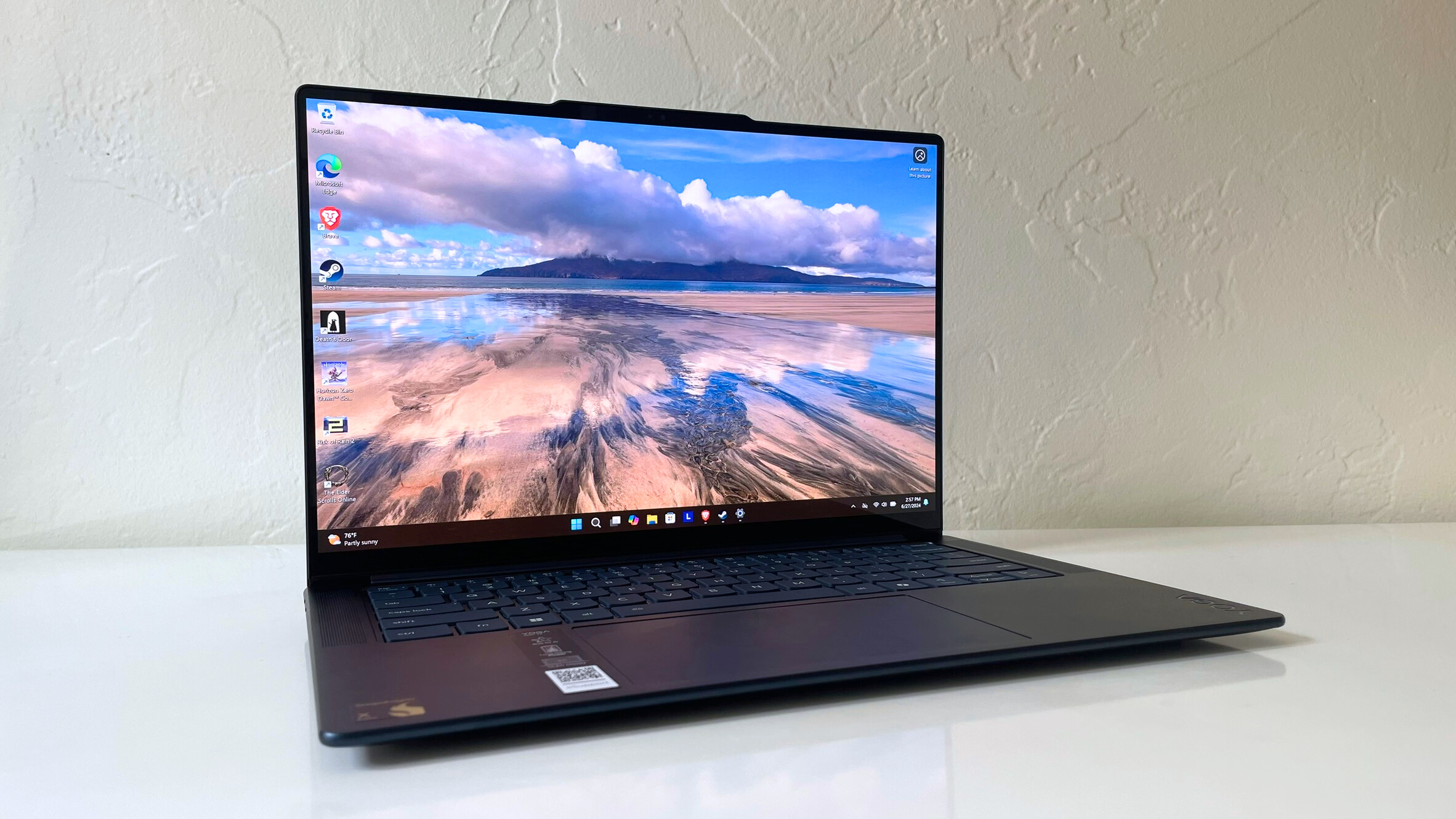
The Lenovo Yoga Slim 7x and Apple MacBook Air M3 each have a few configurations, but there are notable pricing differences. At first glance, the MacBook Air M3 might look like the better deal since it has a slightly lower starting price of $1,099 compared to the Yoga Slim 7x’s $1,199 starting price.
However, the base configurations aren’t exactly equal. We reviewed both with similar specs but very different prices:
RAM and storage are the two most important specs to pay attention to here. We reviewed both laptops with 16GB of RAM and 512GB of storage. However, this MacBook Air M3 configuration costs $300 more than the corresponding Yoga Slim 7x configuration, which is the base model.
While the MacBook Air has a lower starting price, its base configuration includes only 8GB of RAM and 256GB of storage—which won’t get you as far in performance or app capacity. You might wish a few months down the line that you had avoided the base model, especially if you plan on doing tasks like video editing, graphic design, or gaming.
The MacBook Air’s base model also has a less powerful GPU with only eight cores (our review configuration has ten). If you want to upgrade to 512GB of storage, Apple forces you to upgrade to the 10-core GPU, which has an additional $100 upgrade fee.
So, the Lenovo Yoga Slim 7x wins this category since it offers more RAM and storage for less money, providing better all-around value despite a higher starting price.
Winner: Lenovo Yoga Slim 7x
Lenovo Yoga Slim 7x vs MacBook Air M3: Design
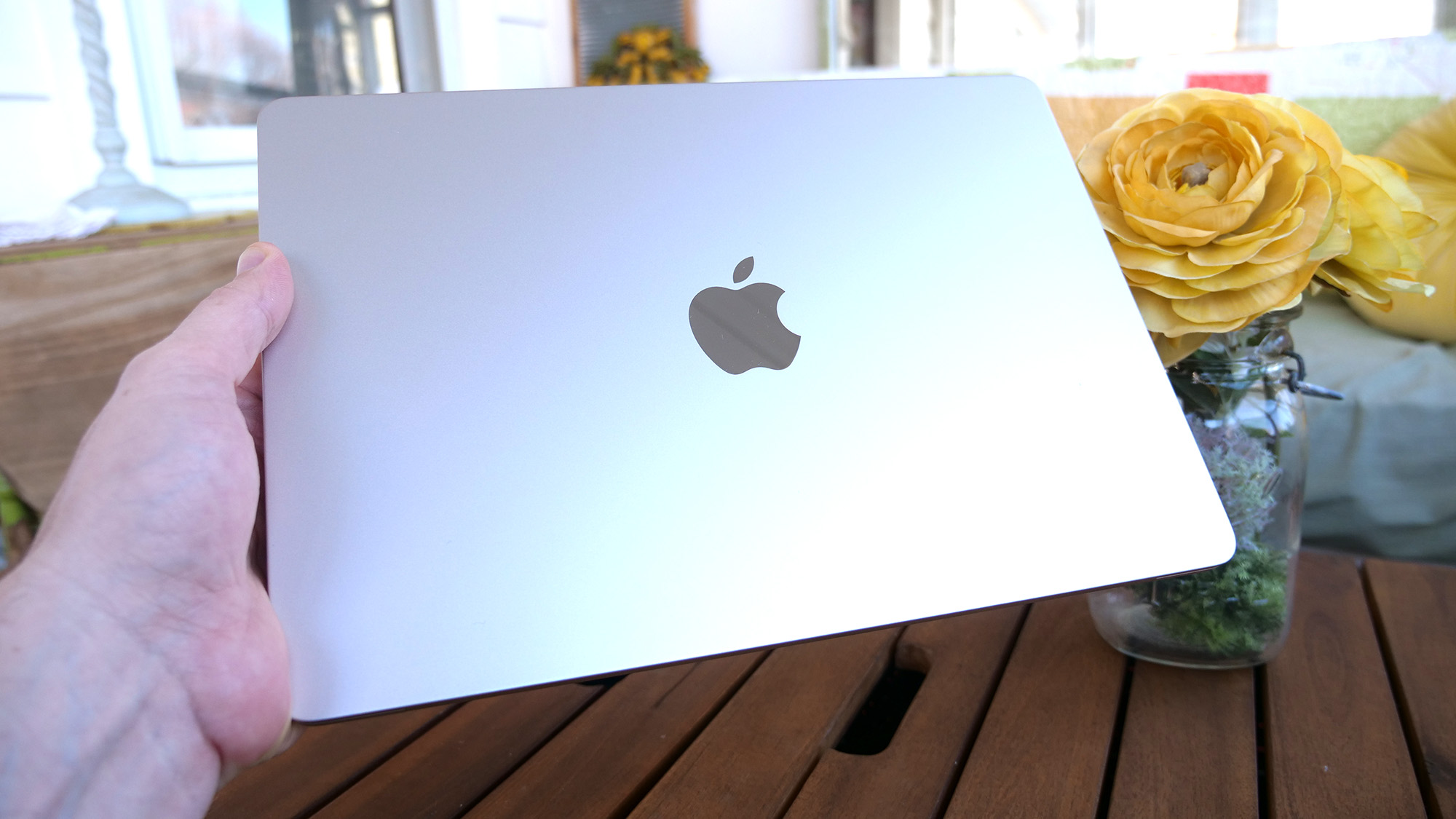
Laptop design can depend heavily on personal preference, but these two designs have many similarities. The Lenovo Yoga Slim 7x and MacBook Air M3 are thin, light laptops with sleek, minimalistic designs and aluminum chassis. Lenovo may have even taken a page from Apple’s book by moving the Lenovo logo on the Yoga Slim 7x to the center of the lid.
There are a few key design differences, though. First, the Yoga Slim 7x is only available in one color at the time of writing: Cosmic Blue, which is a dark metallic navy. The MacBook Air M3 comes in several colors: Midnight, Starlight, Space Gray, and Silver.
Both laptops have effectively the same number of ports, but there are also some differences here:
- The MacBook Air M3: Apple’s proprietary MagSafe 3 charging port, two USB Type-C Thunderbolt ports, and a headphone jack.
- The Yoga Slim 7x: three USB Type-C ports (one is the charging port)
So, you get an extra USB Type-C port on the Yoga Slim 7x but no headphone jack. The USB Type-C ports are also effectively the same when the Yoga Slim 7x is plugged in since it lacks an extra, dedicated charging port.
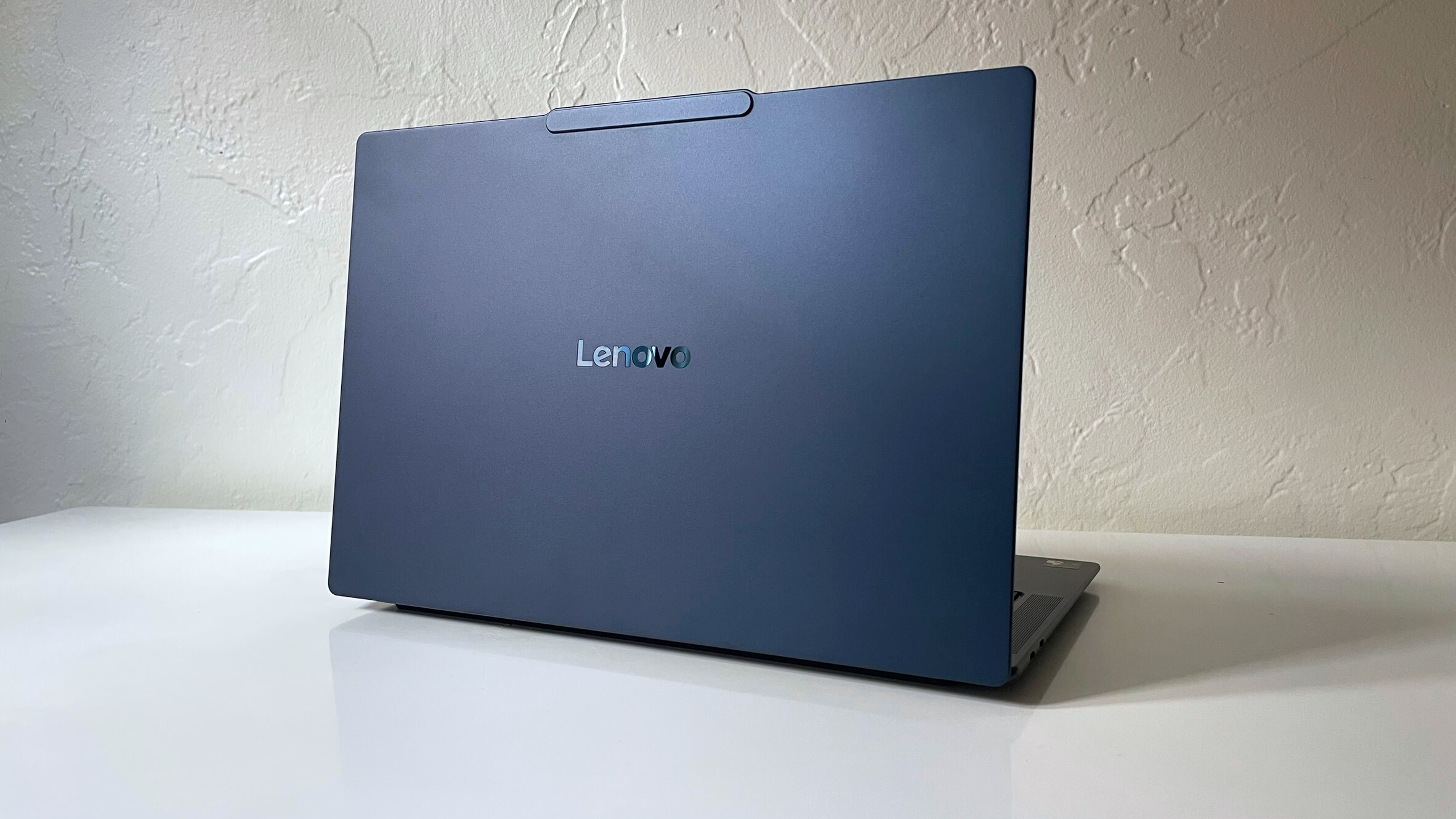
While the overall aesthetic of both laptops is similar, the Yoga Slim 7x has one glaring difference: a camera bump along the top edge of the lid. The MacBook Air M3 has a camera notch on its display, but the lid is uniform all the way around.
In contrast, the lid on the Yoga Slim 7x has a physical outward bump for the webcam. This allows the display to be notch-free, but the camera bump on the lid will likely be a turn off to some. Plus, the overall design of the Yoga Slim 7x’s chassis is very similar to the MacBook Air M3, so this category goes to the MacBook.
Winner: MacBook Air M3
Lenovo Yoga Slim 7x vs MacBook Air M3: Display
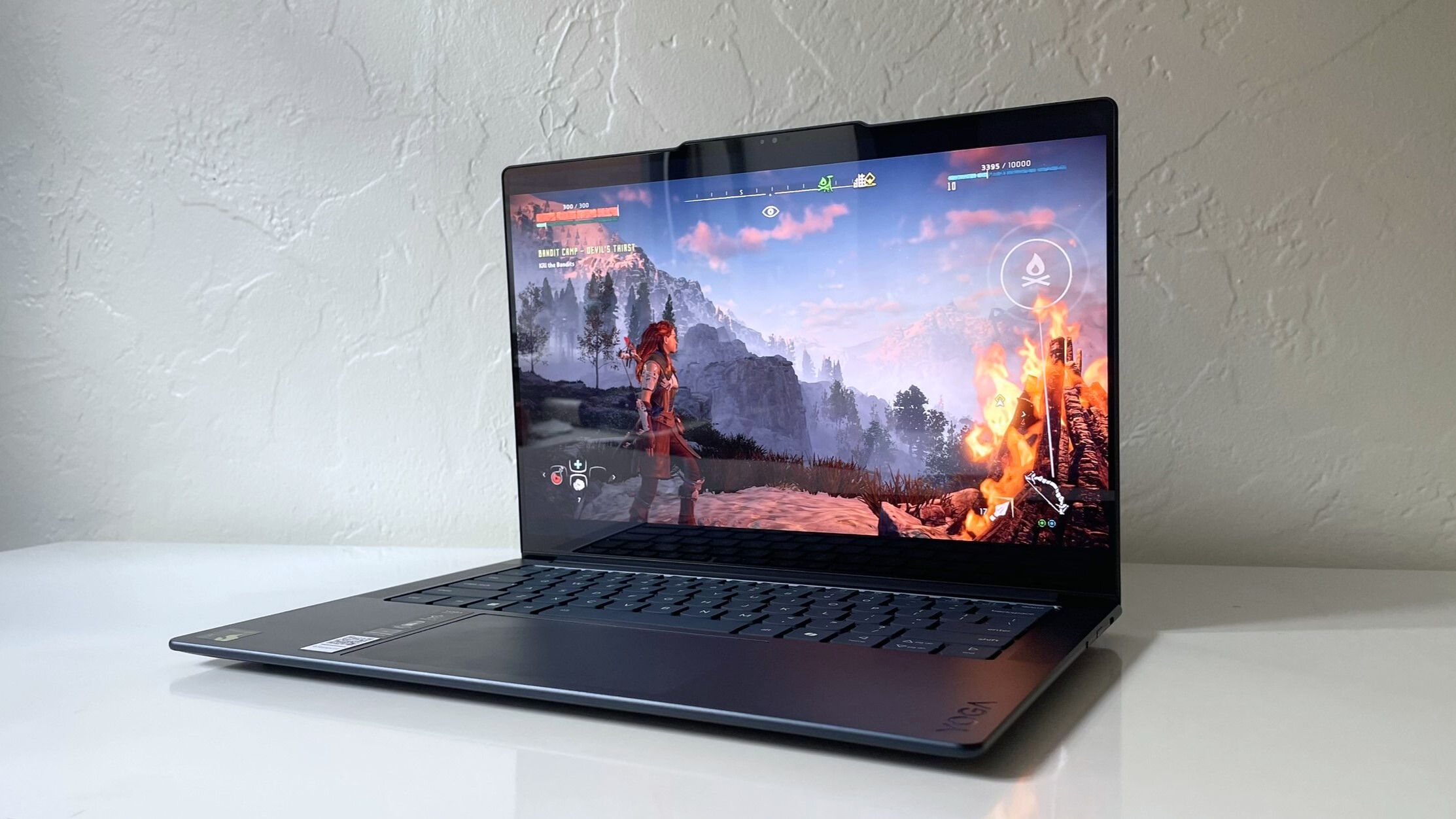
The display is one of the most significant differences between the Lenovo Yoga Slim 7x and the MacBook Air M3. Although they’re similar in size, they have different resolutions and display technologies.
The Yoga Slim 7x features a 14.5-inch 3K 2994 x 1840 OLED touch display. It looks fantastic, with bright colors and sharp details, but is quite reflective, which can be frustrating while watching movies or gaming in a well-lit space.
The MacBook Air M3 has a 13.6-inch 2560 x 1664 Liquid Retina display with Apple’s True Tone technology, which aims to improve color accuracy based on ambient lighting conditions. It also looks great and gets pretty bright, but it falls behind the Yoga Slim 7x in two out of three main display benchmarks:
Winner: Lenovo Yoga Slim 7x
Lenovo Yoga Slim 7x vs MacBook Air M3: Performance
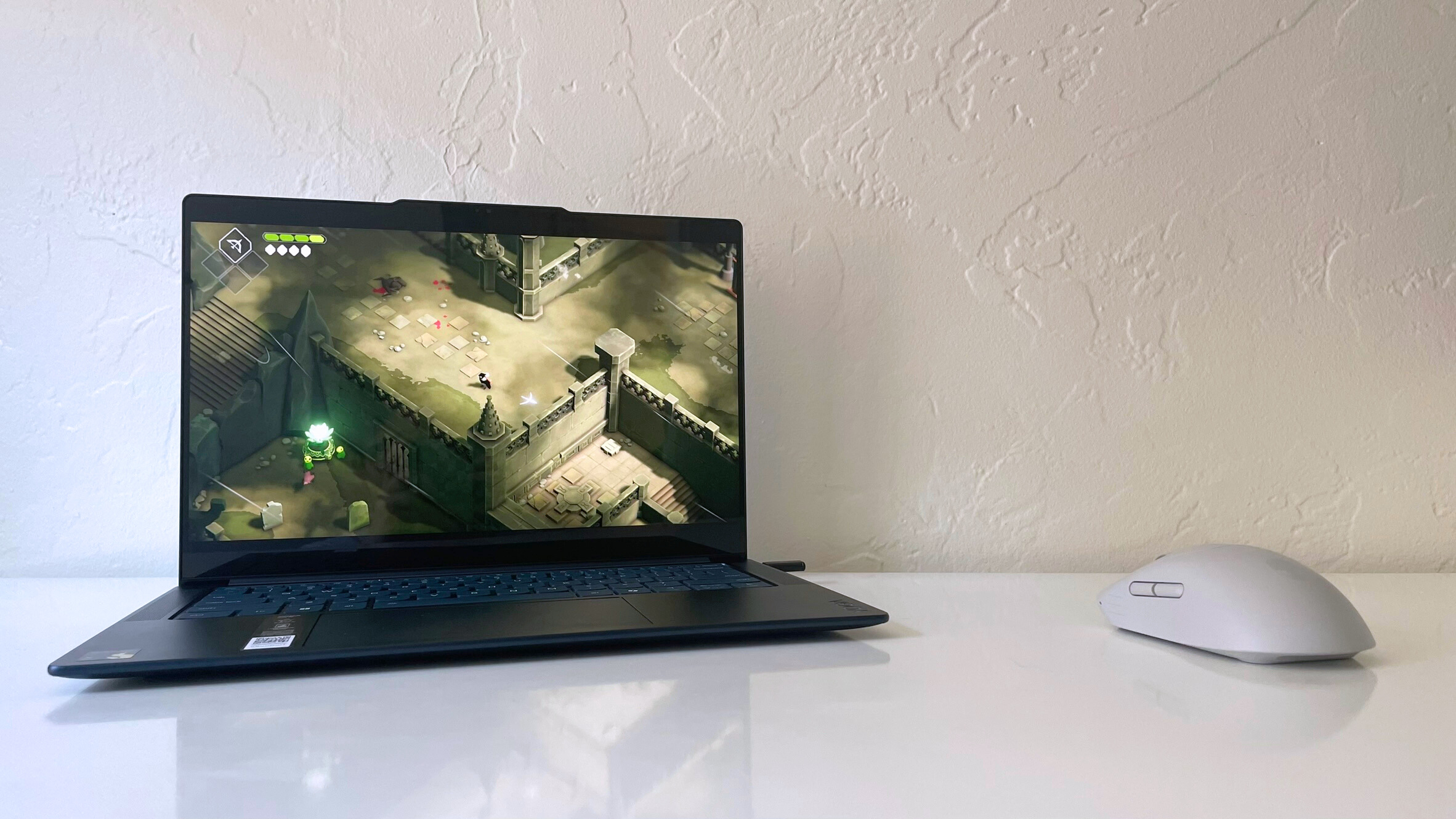
The Lenovo Yoga Slim 7x and MacBook Air M3 performed above average on our benchmark tests, but the results weren’t identical. There are some notable performance differences to consider when deciding between these two devices.
For instance, the MacBook Air M3 has a higher single-core Geekbench 6 result, while the Yoga Slim 7x has a higher multi-core result. This is because the Yoga Slim 7x has 12 CPU cores while the MacBook Air M3 only has 8, resulting in a higher multi-core result for the Yoga Slim 7x. However, the individual cores in the MacBook Air M3 are faster than those in the Yoga Slim 7x despite being fewer in number.
This means the MacBook Air M3 offers stronger single-core performance, while the Yoga Slim 7x has a slight edge in multi-core performance. Single-core performance affects tasks like app launches, while multi-core performance affects tasks like gaming. Different apps and games are optimized to use CPU cores in a variety of ways, so both types of performance are important.
In this case, the Yoga Slim 7x and MacBook Air M3 scored close to one another. The MacBook Air M3 scored 634 points higher in the single-core Geekbench 6 test, while the Yoga Slim 7x scored 1,663 points higher in the multi-core test. So, the MacBook Air is about 25% faster in single-core performance, and the Yoga Slim 7x is about 13% faster in multi-core performance.
The higher performance gap on the single-core Geekbench 6 test could give the MacBook Air M3 an edge in this category, but it came up short on the HandBrake video transcoding benchmark. The Yoga Slim 7x completed this test in just 5 minutes and 20 seconds, but the MacBook Air M3 took over 2 minutes longer. So, the Yoga Slim 7x narrowly wins this category with higher scores in two of three core performance benchmarks.
Winner: Lenovo Yoga Slim 7x
Lenovo Yoga Slim 7x vs MacBook Air M3: Graphics
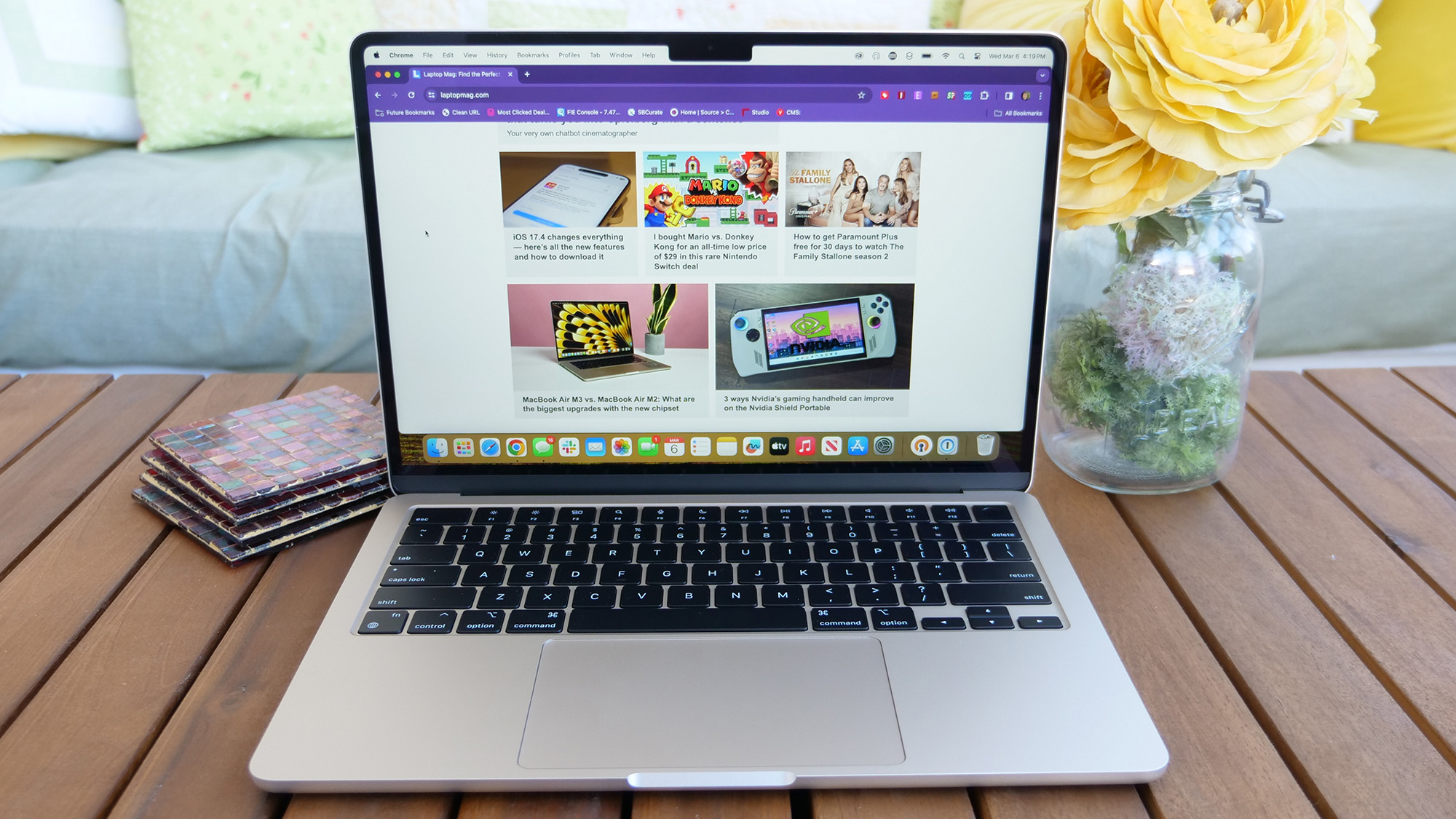
Graphics is one area where there’s a significant performance gap between the Lenovo Yoga Slim 7x and the MacBook Air M3. The difference is drastic enough that this could be a deciding factor for many people.
Running matching graphics tests on Mac and Windows laptops can be tricky since many games and tests don’t run on both platforms. Luckily, Sid Meier’s Civilization VI: Gathering Storm is a reliable game for comparing performance across both operating systems.
Running at 1080p, the Yoga Slim 7x averaged just 20.8 frames per second, while the MacBook Air M3, running at 1920 x 1200, averaged 41.3 fps, double the Yoga Slim 7x’s score. While 1080p wasn’t available on the MacBook Air M3, it still achieved a higher average fps even at the highest graphics setting (2560 x 1664).
Frame rates are not the only area where the MacBook has an edge. Windows laptops are usually better for gaming simply because they’re compatible with a broader range of games than Macs. However, the Lenovo Yoga Slim 7x is a Copilot+ PC running Qualcomm’s Snapdragon X Elite chipset, so it uses Qualcomm’s Arm architecture rather than the x86 infrastructure on Intel and AMD chips.
As a result, many games aren’t natively compatible with the Lenovo Yoga Slim 7x despite being a Windows laptop. It runs many games through Microsoft’s Prism emulator, but some titles, such as multiplayer titles with kernel-level anti-cheat software, won't run on it at all.
This means that the MacBook Air M3 offers higher frame rate averages and is compatible with at least as many if not more games natively (games that can run directly on the device rather than through an emulator).
You can still game on the Lenovo Yoga Slim 7x, but the MacBook Air M3 has the edge in this category.
Winner: MacBook Air M3
Lenovo Yoga Slim 7x vs MacBook Air M3: Battery life
If there’s one thing MacBooks are consistently good at, it’s battery life. The MacBook Air M3 is no exception. While the Lenovo Yoga Slim 7x achieved a strong battery life test result of 14 hours and 14 minutes, the MacBook Air M3 still came out on top with a time of 15 hours and 13 minutes, just under a minute longer than the Yoga Slim 7x.
Those two results are very close, but if battery life is a top priority for you, the MacBook Air M3 is the clear winner.
Winner: MacBook Air M3
Lenovo Yoga Slim 7x vs MacBook Air M3: Overall winner
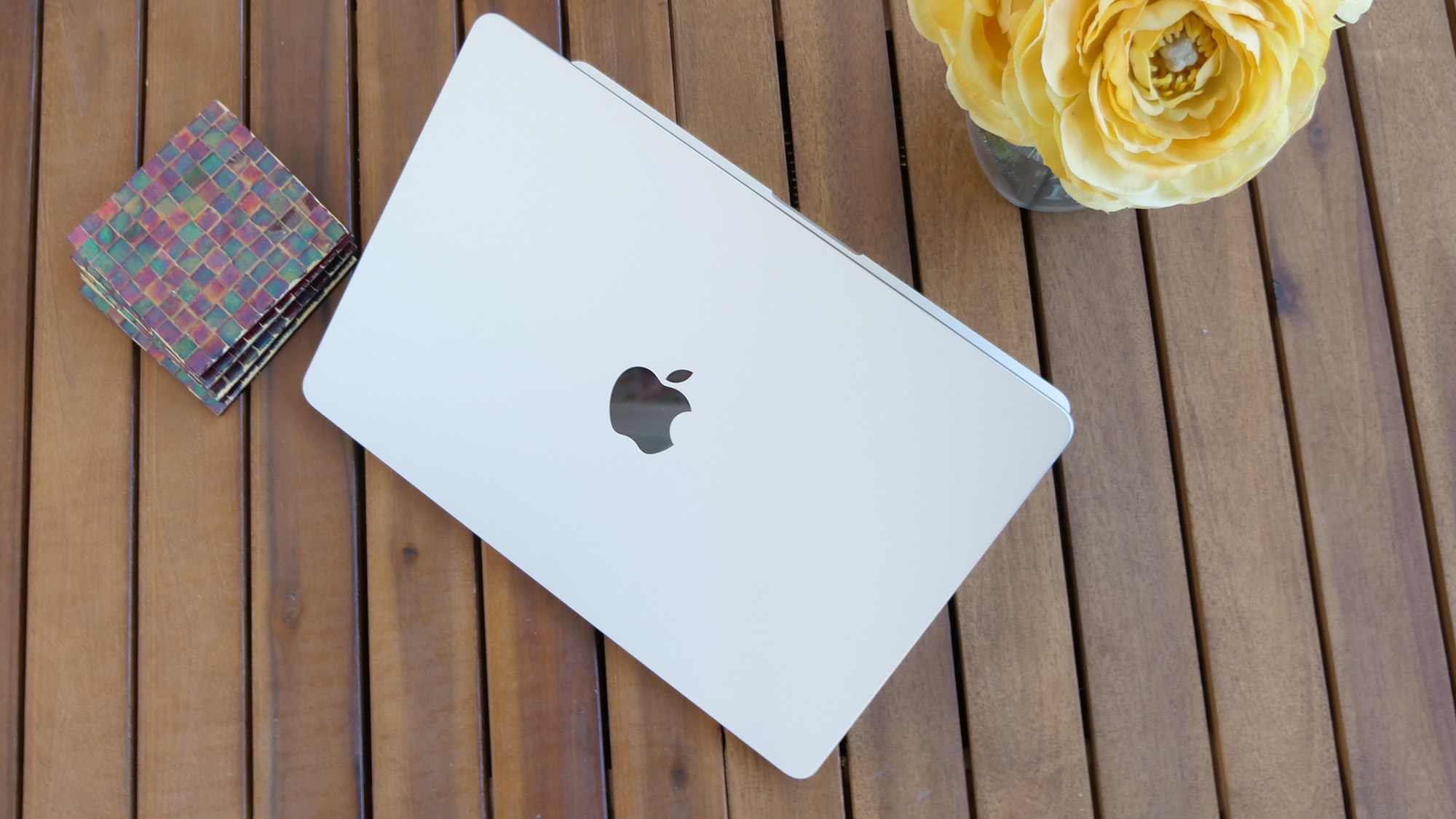
The showdown between the Lenovo Yoga Slim 7x and the Apple MacBook Air M3 is a close contest, with both laptops winning three categories each. However, the MacBook Air M3 is the winner since it won two key categories: graphics and battery life. It also came very close to the Yoga Slim 7x in the performance category with a higher single-core Geekbench 6 score.
App compatibility also played a significant role in the MacBook Air M3's victory. While Intel and AMD Windows PCs still hold the crown for most natively compatible games, the Yoga Slim 7x’s Snapdragon X Elite chipset leaves it lagging due to a lack of natively compatible titles. Many apps and games run through an emulator on the Yoga Slim 7x, which can diminish performance.
So, the MacBook Air M3 is the best laptop for most people between these two models. The only exception is budget users. These are both mid-range laptops, but if you only have $1,200 to spend on a laptop, you’ll get more RAM and storage on the Yoga Slim 7x than you would for the same price on the MacBook Air M3. Lastly, the Yoga Slim 7x also has a better display. It would be nice to see Apple adopt OLED on the MacBook in the coming years, but it still falls behind for now.
To compare the MacBook Air M3 and Yoga Slim 7x to more great laptops, visit our guides to the best laptops and Copilot+ PCs.







